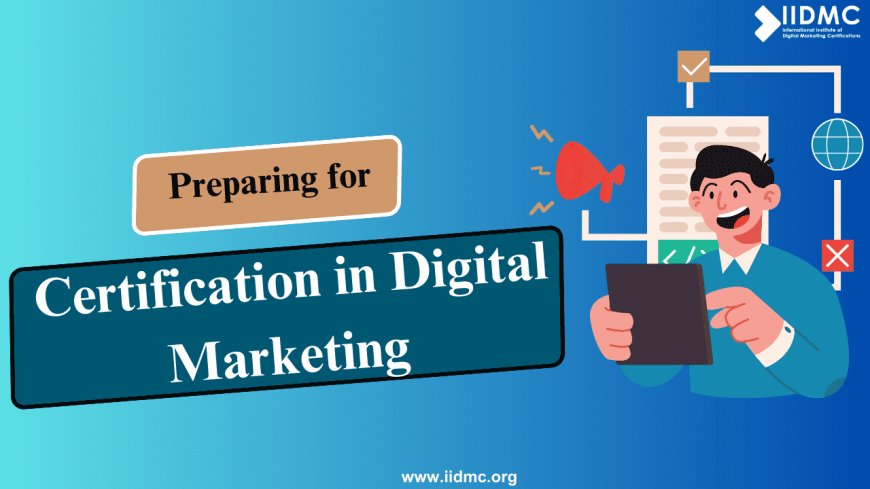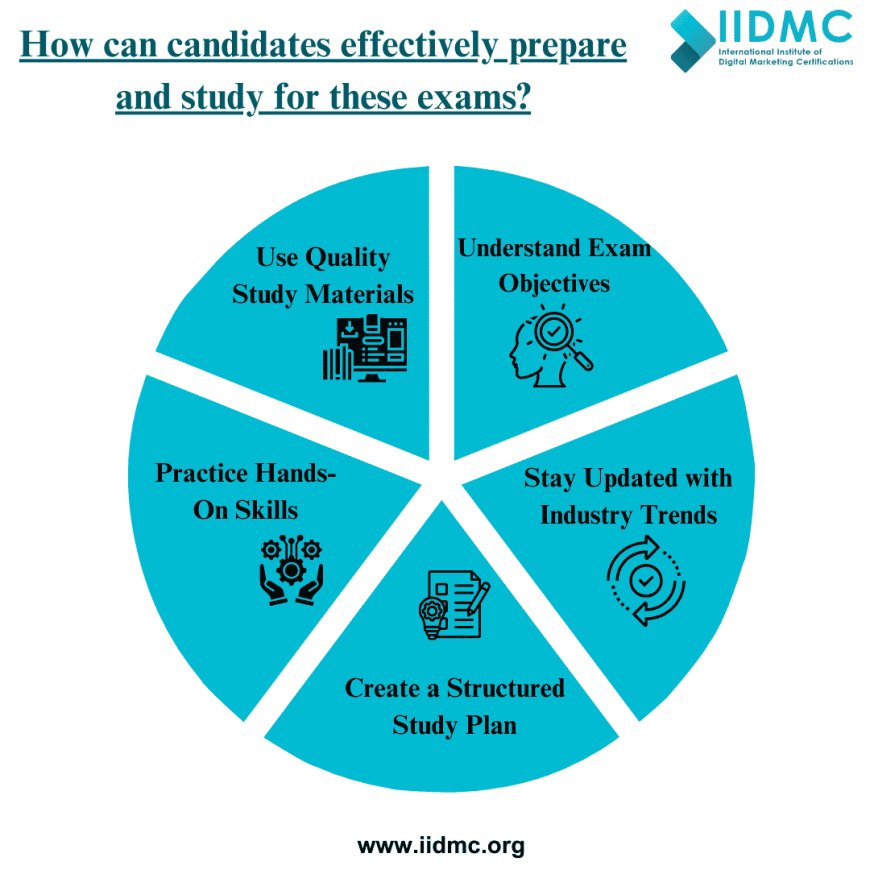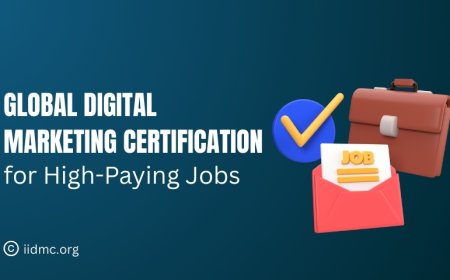Preparing for Certification in Digital Marketing: Expert Tips
Expert tips for digital marketing certification: study strategies, key areas to focus on, and practical advice for exam success

A digital marketing certification has become an essential tool for individuals hoping to prosper in the digital economy in today's quickly changing employment environment. With businesses turning more and more to online platforms, there is a growing need for qualified digital marketers. A certification shows a person's dedication to staying up to speed with industry trends and best practices, in addition to validating their competence. Companies are focusing on more applicants with certified abilities in content preparation, analytics, social media marketing, SEO, and other areas, realizing the importance of these expertise for successful digital campaigns and long-term company expansion. Furthermore, in an increasingly digitally-first world, credentials in digital marketing give individuals a competitive edge and present chances for career advancement and strategic organizational success achievements.
Benefits of Becoming a Certified Digital Marketing expert
Obtaining certification in digital marketing provides a number of important advantages:
- Industry Recognition: Obtaining a certification enhances your reputation with peers and employers by proving your proficiency in a range of digital marketing disciplines.
- Career Advancement: Since certified professionals are frequently chosen for managerial and leadership roles, this opens doors to higher-level work prospects and promotions.
- Improvement of Skills: Offers thorough instruction in important digital marketing domains like analytics, PPC, social media marketing, SEO, and PPC, improving your proficiency in implementing digital strategies.
- Stay Updated: This guarantees that you stay up to speed with best practices, industry trends, and technology developments—all of which are essential for remaining relevant and competitive in your profession.
- Network Expansion: Facilitates networking, partnerships, and knowledge exchange by placing you in contact with a worldwide community of authorized experts.
- Greater Earning Potential: Because certified professionals have specific skills and recognized credentials, they usually command greater compensation than non-certified professionals.
- Employment Security: Assuring more employment stability and resistance to changes in the industry, job security positions you as a valuable asset to employers trying to navigate and flourish in the digital landscape.
- Personal Satisfaction: Getting certified boosts your self-esteem and gives you confidence in your skills, which inspires ongoing professional development.
Challenges and Risks in Exam Preparation for Certification in Digital Marketing
-
Broad Range of Topics: Digital marketing includes a number of different fields, including analytics, social media marketing, email marketing, content marketing, SEO, and SEM. It can be difficult for candidates to address each of these subjects in detail.
-
Complexity of Concepts: A thorough understanding of intricate algorithms, tools, and procedures is necessary for certain areas, such as sophisticated analytics or the technical facets of SEO and PPC. It could be difficult for candidates to understand these details.
-
Changing Industry Trends: New technology, algorithms, and best practices are constantly being introduced in the sector of digital marketing, which is undergoing rapid evolution. It can be intimidating to keep up with the current trends and apply them to your exam preparation.
-
Theory vs. Practice: Although tests assess theoretical knowledge, applying digital marketing skills in practice is just as important. It could be difficult for candidates to connect the theoretical knowledge from study materials with practical situations.
-
Exam Structure and Format: Understanding the exam's structure, question types (multiple-choice, case studies, etc.), and time limits will help to avoid confusion. Performance could be impacted by inexperience with the exam structure.
-
Time Management: Effective time management is necessary to juggle exam preparation with job or personal obligations. It's common for candidates to find it difficult to fit in enough study time around other obligations.
-
Exam Anxiety: Candidates frequently experience performance anxiety or fear of failing. During preparation, confidence and concentration may be affected by the pressure to pass the test and obtain certification.
-
Selecting Study Materials: Candidates may find it challenging to choose reliable and pertinent study materials due to the abundance of information available both online and offline. Effective preparation requires making sure that the study resources are of a high caliber and are dependable.
Handling Issues When Preparing for the Digital Marketing Certification Test
In order to prepare for the certification tests in digital marketing, one must address typical issues including the scope of the material, practical preparation techniques, and effective time management. The wide range of subjects covered by SEO, social media marketing, and analytics might be difficult for candidates to grasp, and they must strike a balance between practical application and in-depth knowledge. Good study techniques include using a variety of resources, practicing practically, and keeping up with business developments. Effective time management is essential, necessitating that applicants make planned study plans and rank important topics according to test goals.

What are the key areas and topics covered in digital marketing certification exams?
key areas and topics covered in digital marketing certification exams,
-
Search Engine Optimization (SEO):
-
methods for improving a website's search engine rankings for Google and Bing.
-
Researching keywords, optimizing the page, and constructing high-quality backlinks are some strategies.
-
Search Engine Marketing (SEM):
-
techniques for paid advertising to increase visibility in search engine rankings.
-
Concentrate on ad performance analysis, bid management, and campaign setup for platforms such as Google Ads.
-
Social Media Marketing (SMM):
-
making use of social media channels to increase consumer interaction and brand exposure.
-
Content planning, sponsored promotions, community management, and analytics are among the topics covered.
-
Content Marketing:
-
generating and disseminating worthwhile content in order to draw in and keep a target audience.
-
includes organizing information, producing it (blogs, films, infographics), choosing a distribution method, and calculating the impact of the finished product.
-
Email Marketing:
-
use email marketing to generate leads and increase conversions.
-
discusses analytics, A/B testing, segmentation, personalization, and email automation to maximize campaign performance.
-
Digital Analytics:
-
Instruments and methods for monitoring user behavior and website performance.
-
Concentrate on tools such as Google Analytics, analyzing data to enhance marketing tactics and boost return on investment.
-
Mobile Marketing:
-
Techniques for using mobile devices to connect with and engage audiences.
-
comprises location-based marketing strategies, SMS campaigns, app marketing, and mobile website optimization.
-
E-commerce Marketing:
-
strategies for marketing that are specific to online retail.
-
discusses how to use analytics for e-commerce success, shopping campaigns, product listing ads, and conversion rate optimization (CRO).
-
Digital Advertising:
-
Techniques for programmatic advertising, retargeting, and display advertising.
-
Ad formats, targeting options, bidding techniques, and tracking ad performance data are the main topics covered.
Together, these subjects give students the tools they need to flourish in a variety of digital marketing-related fields by giving them the know-how to successfully traverse the current digital environment.
A certification in digital marketing gives people the abilities and information they need to prosper in the quickly changing digital economy of today. A certification shows a dedication to remaining up to speed with industry trends and best practices in addition to validating skill in a variety of fields, including analytics, social media marketing, SEO, SEM, and content marketing. While managing the breadth of topics, understanding complicated concepts, and keeping up with industry developments are challenges when preparing for certification tests, these challenges can be lessened with the use of efficient study techniques, real-world application, and strategic time management. In the end, getting certified in digital marketing helps workers execute effective digital strategies in a world driven by technology, improves industry recognition, and opens opportunities to career advancement.





























